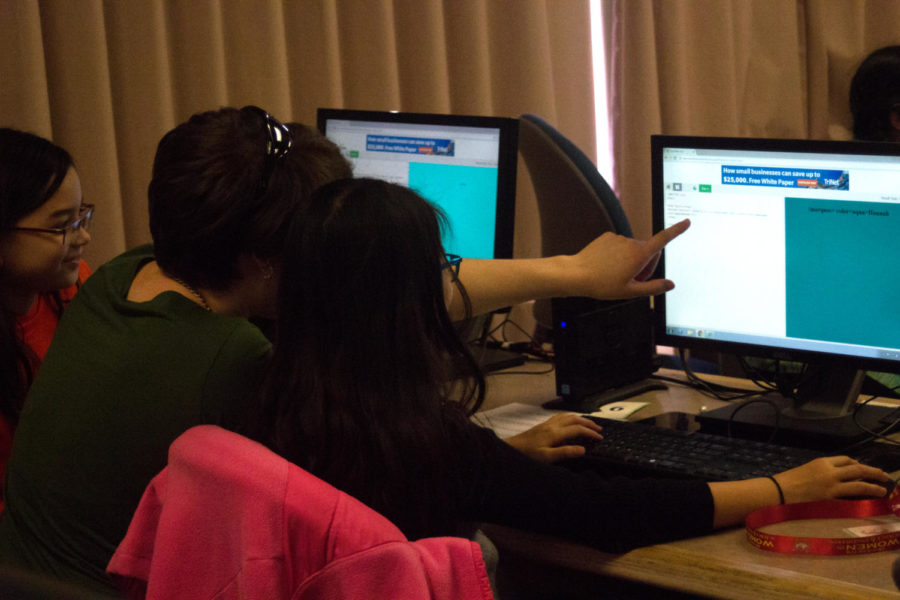Sinclair: Net neutrality in danger
Jackie Norman/ Iowa State Daily
Secretary Adriana Joyce helped the girls carry out the instructions provided to them to build their own websites; the purpose was to help the girls understand computers and how they work. Science Explorations is a club that teaches girls in third to sixth grade about the STEM fields.
February 3, 2017
I was born in 1997, which means the internet has been a large presence throughout my life. From playing Mini Clips games as a child to submitting midterm essays to professors through Blackboard, a free and fair internet has shaped who I am and how I do almost everything in life. Many people, young or old, can say the same thing. It has revolutionized how humans do nearly everything in our day-to-day lives.
Part of this revolutionary freedom is that it is just that: free. No company can change the difficulty of accessing content online for its own personal gain. It is simple and straightforward for someone to go to YouTube and watch videos of dogs jumping at lasers. This freedom has been something I’ve been lucky enough to have in my lifetime.
With the recent appointment of Ajit Pai to chairman of the Federal Communications Commission, this freedom may be at risk. He wants to dismantle parts of the 2015 Open Internet Order, or, as it’s also known as, net neutrality. Net neutrality allows the internet to be open and free to consumers without there being any restrictions on what they can access.
Under this order, Internet Service Providers, or ISPs, cannot block, throttle or enforce paid prioritization for their services. No blocking means ISPs cannot block consumers from any content on the internet. No throttling means ISPs can’t intentionally impair the speed and quality of the internet based on what site you are on. ISPs also cannot enforce paid prioritization, which means they can’t favor their services in terms of speed and accessibility. These protections are incredibly important for protecting free internet services and innovation.
Currently, part of the Open Internet Order is Title II. This is the largest part of net neutrality that Pai wants to dismantle.
“I favor a free and open Internet and I oppose Title II,” Pai said.
Title II allowed the FCC to classify the internet as a utility. This classification gave the FCC the power to regulate ISPs, as discussed above, and allows the internet to remain free from corporate meddling.
Without these regulations, ISPs would be allowed to manipulate speeds and sites in order to push consumers one way or another. It would also stifle innovation and restrict people’s ability to expand the power of the internet. But with these regulations, the internet is not a wasteland controlled by the telecommunication giants. The internet is available to almost everyone, and they are guaranteed that they will be able to fairly access any site they want. This is at the core of net neutrality.
Pai believes in “limited government and a free-market approach to regulations,” which is a statement I don’t wholeheartedly disagree with. The government shouldn’t regulate absolutely everything in our lives, and I usually would agree with a more free market approach to regulations. But in this case, and many others, the government is regulating an industry for the people. People would be in an unfair position if there were no regulations in place to hold back ISPs from being gatekeepers to our internet access. We need these regulations to maintain an open internet and increasing innovation.
Honestly, the idea of ISPs blocking content on the internet or slowing down certain sites and speeding up others to force customers to use their own services is terrifying. I’ve been lucky enough to grow up in world that has had a free internet. Anything I wanted to know or find could be easily and quickly accessed.
This ability has allowed us as a country, and as a people, to advance and grow in ways we never could have before. I don’t want us to lose that. If these regulations are dismantled, we may be thrust into an internet where people are forced to go to predetermined places for information and streaming.
There will be fewer options to get your information, and corporations will stifle innovation by forcing consumers to only spend time on their sites and services. ISPs will control our every movement online, basically ending all the growth we’ve made so far. Net neutrality is a freedom we should covet now and protect for the future.
















